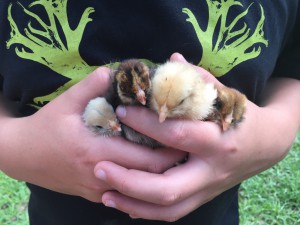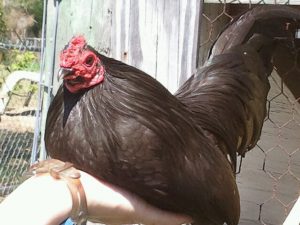by Julie Pigott Dillard | Mar 1, 2019
 Registration opens today for the 2019 4-H Chick Chain project! This project teaches youth how to raise baby chicks to laying age using science-based best practices. At the end of the project, youth compete in a showmanship and skill-a-thon contest to test their knowledge and also exhibit their birds for judging and awards.
Registration opens today for the 2019 4-H Chick Chain project! This project teaches youth how to raise baby chicks to laying age using science-based best practices. At the end of the project, youth compete in a showmanship and skill-a-thon contest to test their knowledge and also exhibit their birds for judging and awards.
HOW DOES THE 4-H CHICK CHAIN PROJECT WORK?
Purchase or hatch your own chicks during the month of March. The number you choose to purchase or hatch is up to you, but we recommend that you begin with at least three chicks.
Chicks must be from the following breeds:

Chicken breeds have unique needs and personalities. Do some research before you choose your breed.
- Australorp
- Barred Rock
- Brahma
- Jersey Giant
- Leghorn
- Orpington
- Rhode Island Red
- Silky
- Welsummer
- Wyandotte
There is an orientation webinar and a hands-on workshop to get you ready for the show. Your 4-H Agent or project volunteer can also make a home visit to check up on your progress.
HOW DO I SIGN UP?
4-H Chick Chain is open to all youth ages 5-18 who are enrolled or enroll as new members in 4-H. Enroll now.
Registration opens March 1 and closes March 31 in 4honline.
Families can share a project, but each youth should be individually registered.
Members who participated in the 2018 4-H Chick Chain project can register as a returning production project.
REGISTRATION FEES:
- 2019 New Project: $20
- 2018 Returning Production Project: $10
To learn all about the project, read the 2019 4-H Chick Chain Youth Project Guide.
If you’re an adult with a love of poultry that you’d like to share with others, consider becoming a 4-H poultry project leader. Our poultry programs include 4-H Embryology in the Classroom, 4-H Chick Chain, and 4-H livestock clubs. Visit http://florida4h.org/volunteers to find out more. To learn more about 4-H in your county, contact your local UF/IFAS Extension Office.
Still have questions about 4-H Chick Chain? Contact project chair – Julie P. Dillard – juliepd@ufl.edu or call 850.638.6180.

Best of Breed winners from the 2018 4-H Chick Chain.
by Prudence Caskey | Feb 2, 2017
 The term “Backyard Chickens” is one many people use today. The idea of having a pet help you make breakfast is growing in popularity. I am often questioned as to which breed of chicken is the best breed. When asked, I always reply, “What do you want the chicken to do?” The reason I ask is because The American Poultry Association recognizes 65 different breeds of chickens. Each breed can meet a different need. Many people will blurt out, “I want eggs!” Well, do you care what color eggs? Do you care how often you get eggs? Does the size of the egg matter? Each breed is different and there are pros and cons to each breed. Some of the more popular breeds that you can find at your local feed store during upcoming “Chick Days” are described below:
The term “Backyard Chickens” is one many people use today. The idea of having a pet help you make breakfast is growing in popularity. I am often questioned as to which breed of chicken is the best breed. When asked, I always reply, “What do you want the chicken to do?” The reason I ask is because The American Poultry Association recognizes 65 different breeds of chickens. Each breed can meet a different need. Many people will blurt out, “I want eggs!” Well, do you care what color eggs? Do you care how often you get eggs? Does the size of the egg matter? Each breed is different and there are pros and cons to each breed. Some of the more popular breeds that you can find at your local feed store during upcoming “Chick Days” are described below:
- Rhode Island Red: This is a breed that is a large-bodied bird that lays a large to extra-large brown egg. These hens are very personable and can have a great personality. This breed can become a pet in no time.
- White Leghorn: This particular bird will lay a large white egg on a very regular basis. The Leghorn is not friendly and is often referred to as “flighty”. Leghorns will not, as a general rule, become pets. They will lay you an egg almost daily, but will run from you when it’s time to collect those eggs.
- (Buff) Orpington: Usually sold in the color buff, additionally available in other colors. This is a large-bodied friendly bird. Orpingtons can become fast friends and will serve as a dual-purpose member of your flock. This means that they are great egg layers, and will also serve as a good meat bird if the desire or need arises.
- Sex-link varieties: With this breed, you will not get a breed, but they have great production. Sometimes called Red Star, or Black Star, the chicks show a difference when day old chicks. It will be easy to determine between the two. If chicks are not your thing, you can always purchase young hens that are just starting to lay.
Many people are not ready to wait five to six months to get their beloved eggs from their new pets. If that is the case, you can always check with your local extension office to inquire if a local 4-H member might have some young hens for sale. On September 30th, 4-H members from across the panhandle will have a “Chick Chain” show and Auction. Save the date and get the best breed for you!
If you have children between the ages of 5-18 (as of September 1st, 2016) and you are interested in starting a backyard flock, you may want to sign up for the 4-H Chick Chain. This program teaches youth how to raise, care for, and show chickens. Registration is open February 1st-24th via 4HOnline. Youth will receive 12, day-old pullets on March 29th. Throughout the spring and summer, youth will learn the ins and outs of poultry farming, and how to market their eggs and hens for profit. They will keep business and health records, learn about bio-security, and gain poise, confidence, and communication skills while showing their hens in the fall. For more information, contact your local UF IFAS County Extension Office, or read about last year’s program.
4-H Poultry Project
4-H Embryology Project
4-H Chick Chain
Poultry Breeds:
Care of Baby Chicks
Factors Affecting Egg Production in Backyard Chicken Flocks
Intestinal Parasites in Backyard Chicken Flocks
Prevention and Control of Fowl Pox in Backyard Chicken Flocks
Small Flock Poultry Nutrition
Vaccination of Small Poultry Flocks
 Registration opens today for the 2019 4-H Chick Chain project! This project teaches youth how to raise baby chicks to laying age using science-based best practices. At the end of the project, youth compete in a showmanship and skill-a-thon contest to test their knowledge and also exhibit their birds for judging and awards.
Registration opens today for the 2019 4-H Chick Chain project! This project teaches youth how to raise baby chicks to laying age using science-based best practices. At the end of the project, youth compete in a showmanship and skill-a-thon contest to test their knowledge and also exhibit their birds for judging and awards.


